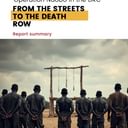The Asia-Pacific Journal, Japan Focus, recently featured an article entitled, “Death Penalty Lessons from Asia,” written by David T. Johnson and Franklin E. Zimring. The article is based in part on the authors’ book, The Next Frontier: National Development, Political Change, and the Death Penalty in Asia. Johnson is Professor of Sociology at the University of Hawaii. Zimring is the William G. Simon Professor of Law and Wolfen Scholar at the University of California at Berkeley’s Boalt Hall School of Law. The article takes an in-depth look at the practice of the death penalty in Asian jurisdictions over the last few decades. Drawing parallels with the death penalty movement in Europe, Johnson and Zimring present economic development, political change and public opinion as influential to the practice of capital punishment in Asian countries. Their book is based on 5 major case studies of capital punishment in Japan, the Philippines, South Korea, Taiwan, and China, and 7 shorter case studies of capital punishment in North Korea, Hong Kong and Macao, Vietnam, Thailand, Singapore, and India.
In the article in Japan Focus, the authors concluded,
[T]here have been declines in executions as a tool of crime control and in the political reputation of state execution in the region. Economic development and political democracy are both correlated with declining executions and with the abolition of capital punishment, but neither prosperity nor democracy is a sufficient condition for ending the death penalty. Concerns about the concentration of state power and its misuse are as prominent a theme in anti-death penalty rhetoric in Asia as they are in the West, and the most important feature of Asian nations that predicts their level of execution is not culture or crime rate but rather the nature of the political regime. Only authoritarian governments execute with any frequency in Asia, and most of the hard line authoritarian states in Asia where high rates of execution continue to occur are communist. Thus, while the political circumstances of Asia are different from those found in other parts of the world, the influence of political characteristics on death penalty policy are similar.
(D. Johnson & F. Zimring, “Death Penalty Lessons from Asia,” The Asia-Pacific Journal, Vol. 39 – 1‑09, September 28, 2009; book, “The Next Frontier: National Development, Political Change, and the Death Penalty in Asia,” Oxford University Press, 2009).


